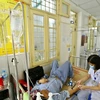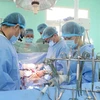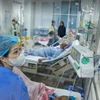Professional midwifery services during pregnancy and childbirth are critical to lowering the mortality rate of women and babies, a conference heard on Nov. 10.
Speaking at the event organised by the United Nations Population Fund (UNFPA) and Ministry of Health, Representative of the UNFPA in Vietnam, Bruce Campbell said that while most births in developed countries were aided by skilled attendants, one in three women in developing countries gave birth alone or with only relatives.
Figures from the report revealed that 1,000 women died as a result of pregnancy-related complications and about 5,500 newborns died in the first week of their life for lack of adequate daily medical care.
Another 35,000 women suffered severe illnesses or disabilities, including obstetric fistula, severe uterine prolapse, depression and infertility, it said.
The report also pointed out that unless about 112,000 midwives were trained and deployed in a supportive environment, 38 of 58 countries surveyed might not meet their target of 95 percent of births attended by a skilled midwife by 2015, as the Millennium Development Goal required.
Currently, the globe is facing a shortage of about 350,000 midwives. On average, the community needs at least six midwives per 1,000 births.
"Pregnant women and newborns will continue to die needlessly without an increase in the number of midwives and improved clinical skills," Campbell said.
"If midwives are in the right place and can accompany the most severe complications to specialised hospitals or health clinics, up to 90 percent of maternal deaths could be prevented."
Deputy Minister of Health, Nguyen Viet Tien said that midwives and midwifery practice played a crucial role in Vietnam 's maternal and newborn health care system.
The initiative of training village-based midwives was practical and effective, especially in remote and hard-to-reach areas where home births were common due to poverty that hindered access to health care services, he said.
Dr Tran Thi Huong of northern mountainous of Ha Giang Province's Health Centre said that difficult roads, poverty and customs required only husbands or relatives to take care of women during and after delivery, resulting in 80 percent home delivery.
Huong said that the model of village-based midwives had been more effective than local health workers, who hardly knew the ethnic minority language and only went to remote areas once a month.
Di Thi Rum, an ethnic minority midwife in Coc Re Commune, Xin Man District in Ha Giang Province, said she completed a six-month training on midwifery two years ago and then persuaded many pregnant villagers with potential breech deliveries to go to local health clinics.
"The roads are so difficult that walking is the only choice when I go to pregnant women's houses. My job is to check their health, provide reproductive information, persuade them to go to hospitals if necessary and sometimes help them deliver at home," Rum said.
Rum said her villagers only listened to advice from their locals, adding that local residents had gradually quit the habit of cutting placenta with broken terracotta pots or dirty knives.
PhD Luu Thi Hong, deputy director of the ministry's Department of Maternal and Child Heath, said that the quality of midwives was generally limited.
A recent survey among 232 midwives at the district and commune-level showed that most didn't have sufficient skills for birth attendants and none correctly practised three of the most important skills to aid mothers and newborns.
The reason, according to Hong, is the lack of training time, which only lasts six to 18 months for village-based midwives and two years for district-level ones.
A shortage of official training programmes and low payment for village-based midwives also contributed to the low quality improvement.
For example, village-based midwives in northern Dien Bien Province were paid only 50,000 VND ($2.5 USD) per month for their jobs. Most still had to work in the fields to earn their livings.
Health representatives suggested that the profession of midwifery should be further improved by increasing payment and supportive policies for midwives, especially those in remote areas.
The health sector should increase the quality of training for midwives, especially with the basic skills of birth attendants while working with international and domestic organisations to boost supportive programmes on mothers and newborns.
Office-in-charge of the World Health Organisation in Vietnam Wo Guogao agreed, saying that midwives should have appropriate employment, protection, remuneration, incentives and motivation.
"Midwives don't only deliver babies, they also offer many related services before and after the delivery. They are crucial in the communities and to the survival of women and children," he said./.
Speaking at the event organised by the United Nations Population Fund (UNFPA) and Ministry of Health, Representative of the UNFPA in Vietnam, Bruce Campbell said that while most births in developed countries were aided by skilled attendants, one in three women in developing countries gave birth alone or with only relatives.
Figures from the report revealed that 1,000 women died as a result of pregnancy-related complications and about 5,500 newborns died in the first week of their life for lack of adequate daily medical care.
Another 35,000 women suffered severe illnesses or disabilities, including obstetric fistula, severe uterine prolapse, depression and infertility, it said.
The report also pointed out that unless about 112,000 midwives were trained and deployed in a supportive environment, 38 of 58 countries surveyed might not meet their target of 95 percent of births attended by a skilled midwife by 2015, as the Millennium Development Goal required.
Currently, the globe is facing a shortage of about 350,000 midwives. On average, the community needs at least six midwives per 1,000 births.
"Pregnant women and newborns will continue to die needlessly without an increase in the number of midwives and improved clinical skills," Campbell said.
"If midwives are in the right place and can accompany the most severe complications to specialised hospitals or health clinics, up to 90 percent of maternal deaths could be prevented."
Deputy Minister of Health, Nguyen Viet Tien said that midwives and midwifery practice played a crucial role in Vietnam 's maternal and newborn health care system.
The initiative of training village-based midwives was practical and effective, especially in remote and hard-to-reach areas where home births were common due to poverty that hindered access to health care services, he said.
Dr Tran Thi Huong of northern mountainous of Ha Giang Province's Health Centre said that difficult roads, poverty and customs required only husbands or relatives to take care of women during and after delivery, resulting in 80 percent home delivery.
Huong said that the model of village-based midwives had been more effective than local health workers, who hardly knew the ethnic minority language and only went to remote areas once a month.
Di Thi Rum, an ethnic minority midwife in Coc Re Commune, Xin Man District in Ha Giang Province, said she completed a six-month training on midwifery two years ago and then persuaded many pregnant villagers with potential breech deliveries to go to local health clinics.
"The roads are so difficult that walking is the only choice when I go to pregnant women's houses. My job is to check their health, provide reproductive information, persuade them to go to hospitals if necessary and sometimes help them deliver at home," Rum said.
Rum said her villagers only listened to advice from their locals, adding that local residents had gradually quit the habit of cutting placenta with broken terracotta pots or dirty knives.
PhD Luu Thi Hong, deputy director of the ministry's Department of Maternal and Child Heath, said that the quality of midwives was generally limited.
A recent survey among 232 midwives at the district and commune-level showed that most didn't have sufficient skills for birth attendants and none correctly practised three of the most important skills to aid mothers and newborns.
The reason, according to Hong, is the lack of training time, which only lasts six to 18 months for village-based midwives and two years for district-level ones.
A shortage of official training programmes and low payment for village-based midwives also contributed to the low quality improvement.
For example, village-based midwives in northern Dien Bien Province were paid only 50,000 VND ($2.5 USD) per month for their jobs. Most still had to work in the fields to earn their livings.
Health representatives suggested that the profession of midwifery should be further improved by increasing payment and supportive policies for midwives, especially those in remote areas.
The health sector should increase the quality of training for midwives, especially with the basic skills of birth attendants while working with international and domestic organisations to boost supportive programmes on mothers and newborns.
Office-in-charge of the World Health Organisation in Vietnam Wo Guogao agreed, saying that midwives should have appropriate employment, protection, remuneration, incentives and motivation.
"Midwives don't only deliver babies, they also offer many related services before and after the delivery. They are crucial in the communities and to the survival of women and children," he said./.



















